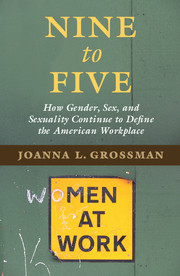Book contents
- Frontmatter
- Dedication
- Contents
- Foreword
- Acknowledgments
- Introduction
- PART I WHAT IS SEX DISCRIMINATION?
- 1 Sexual Jealousy
- 2 Too Hot to Be a Dental Hygienist?
- 3 A Twist on the Problem of Sex Inequality in Coaching
- 4 Mixed Motives
- 5 Sex Stereotyping and Dress Codes
- 6 A Victory for Transgender Employees
- 7 How Fast Must Female Transit Officers Run?
- 8 Who Is Protected by Antidiscrimination Laws?
- 9 Punishing the Coach Who Stood Up for His Female Athletes
- 10 Broader Protection against Workplace Retaliation
- 11 The Supreme Court Protects Retaliation Victims but Still Leaves Gaps in the Law
- PART II SEXUAL HARASSMENT
- PART III PREGNANT WOMEN AND MOTHERS AT WORK
- PART IV FEMALE BREADWINNERS AND THE GLASS CEILING
- Conclusion
- Notes
- Index
7 - How Fast Must Female Transit Officers Run?
from PART I - WHAT IS SEX DISCRIMINATION?
Published online by Cambridge University Press: 05 May 2016
- Frontmatter
- Dedication
- Contents
- Foreword
- Acknowledgments
- Introduction
- PART I WHAT IS SEX DISCRIMINATION?
- 1 Sexual Jealousy
- 2 Too Hot to Be a Dental Hygienist?
- 3 A Twist on the Problem of Sex Inequality in Coaching
- 4 Mixed Motives
- 5 Sex Stereotyping and Dress Codes
- 6 A Victory for Transgender Employees
- 7 How Fast Must Female Transit Officers Run?
- 8 Who Is Protected by Antidiscrimination Laws?
- 9 Punishing the Coach Who Stood Up for His Female Athletes
- 10 Broader Protection against Workplace Retaliation
- 11 The Supreme Court Protects Retaliation Victims but Still Leaves Gaps in the Law
- PART II SEXUAL HARASSMENT
- PART III PREGNANT WOMEN AND MOTHERS AT WORK
- PART IV FEMALE BREADWINNERS AND THE GLASS CEILING
- Conclusion
- Notes
- Index
Summary
How fast should an applicant be able to run 1.5 miles if she wants to be a transit police officer in Philadelphia? That is the question at the heart of an opinion by the Third Circuit Court of Appeals, in the case of Lanning v. Southeastern Pennsylvania Transit Authority (SEPTA).
The plaintiffs are five unsuccessful female applicants, who, according to SEPTA, could not run fast enough to become transit officers. They have sued under Title VII, the main federal antidiscrimination statute. In their complaint, the five women allege that the transit authority's fitness requirements constitute “disparate impact discrimination” – that is, they discriminate against women candidates because they result in very few women being hired as officers.
Lanning provides a lesson on how to analyze cases of “disparate impact” discrimination. (“Disparate impact” discrimination occurs when a facially neutral employment practice has a disproportionately adverse effect on a protected group, such as women or African Americans.) Lanning also provides a cautionary tale about the way in which an appropriate legal standard – here, the standard for disparate impact discrimination – can be undermined if courts misapply it.
HOW THE RUNNING TEST WAS DEVISED
The test the women are challenging was developed by an exercise physiologist, Dr. Paul Davis. In 1991, SEPTA hired Dr. Davis to develop a fitness test for its police officers. To do so, Dr. Davis accompanied existing transit officers on the job for two days to gain an understanding of their day-to-day job tasks. He also conducted a study with twenty experienced officers to determine what physical abilities and what level of fitness were required for adequate performance of their jobs. He concluded that applicants must run, jog, and walk on the job.
The officers in the study suggested that an applicant should be able to run a mile in 11.78 minutes, while wearing full gear. But Dr. Davis rejected that standard as too low, based on his assessment that any individual could do that. He also considered heightening the standard to force applicants to demonstrate an aerobic capacity of 50 mL/kg/min, but he dismissed that option because of the “draconian effect” it would have on women.
Finally, Dr. Davis decided that something in between would be just right and recommended that SEPTA insist on an aerobic capacity of 42.5 mL/kg/min. To prove they had this capacity, applicants would have to run 1.5 miles in twelve minutes.
- Type
- Chapter
- Information
- Nine to FiveHow Gender, Sex, and Sexuality Continue to Define the American Workplace, pp. 39 - 44Publisher: Cambridge University PressPrint publication year: 2016



